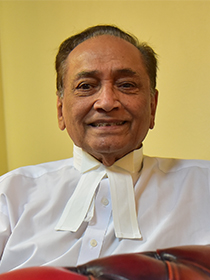Publicité
“The prime minister becomes investigator, judge, and executioner all at once”
Par
Partager cet article
“The prime minister becomes investigator, judge, and executioner all at once”


With the recent passing of the Immigration Amendment Act, Weekly speaks to Yousuf Mohamed for his take on it as a lawyer. He also shares his views on other current issues such as the case of Hofman in relation to the Civil Code and May Day crowds and implications.
The Immigration Amendment Act, enacted recently, seems to us to be a very dangerous law. But there was silence from the lawyers, including you. Why did we not hear you?
I was getting treatment in London, that’s why you did not hear me. You’ve mentioned that it is dangerous. I would say it’s a glaring sign of dictatorship. Let me read to you one paragraph from the new law: “…persons who, from information or advice which in the opinion of the minister is reliable information or advice, are likely to be undesirable inhabitants or visitors to Mauritius and furthermore, person or class of persons who, from information or advice which in the opinion of the minister is reliable information or advice, is likely to be prejudicial to the interests of defence, public safety, public order, public morality or public health’. First of all, who are the people who will be giving advice to the minister? More importantly, what prevents the minister from saying ‘I have reliable information’? Who is going the verify that?
Does the new law, however, not stop terrorists and criminals from coming and living here?
We already have laws for that. Have we had terrorism in the country? Have we had any people coming to Mauritius who are terrorists?
We can’t wait until they come to enact laws to prevent them from coming, can we?
I concede, but the Prevention of Terrorism Act (POTA) as it was is more than enough. We didn’t have to wait for an act to occur before dealing with it. There is nothing in the amendment which provides more protection to the country from terrorists. But here we have a situation where Mr. Patrick Hofman has said Mr. Pravind Jugnauth is a‘fou´, then Mr. Jugnauth amends the law where he becomes the judge, based on information that he has received, we don’t know from whom he might have received, or if he has not got it, but he then decides that Mr. Hofman is persona non grata.
Before the law was changed, who decided on the status of foreigners marrying Mauritian nationals?
In the original act, the prohibited immigrants were people who appeared to the immigration officer (he stresses) – the immigration officer, not the prime minister – to be suffering from a physical deformity etc. and it was based on objective criteria like committing a crime which in Mauritius would be punishable by imprisonment, being prostitutes, beggars or vagrants, people likely to be a charge on public funds and persons engaged or are suspected of engaging in any activity prejudicial to the integrity or sovereignty of Mauritius or likely to engage in subversive activity against Mauritius, suspected international terrorists etc. So that was all already there in the law to be applied by the immigration officer. With the amendment to the law, the immigration officer is out. We are now dealing with the prime minister’s opinion – we don’t know on whose advice or information – about who is likely to be an undesirable inhabitant. The new law also concerns ‘those persons whose continued presence is likely to be prejudicial to public safety, public order, public morality etc.’ So you can see that the prime minister becomes investigator, judge, and executioner all at once.
Hofman and his wife can still live together in Belgium, can’t they?
Who says so? Look at the other section of the Civil Code, section 215, which says that a couple can live where they choose. Let me give you the decision of a court in France. “If the spouses can temporarily have distinct residences, especially for professional reasons, the matrimonial intention implies the will to a shared life”. Article 215 does not allow an act which deprives a family of its domicile. So, when a Mauritian girl gets married to a foreigner, they should be able to live in Mauritius. Take my daughter-in-law for example. She is a French national, got married to my son and they live here. If they had got married after this amendment, the prime minister might have taken the decision not to allow that because she is the wife of a political opponent. Their rights under the Civil Code would have been violated.
Some people are asking why get married now?
A couple can decide to get married any time they want. Why is it that Mr. Hofman got married now? That’s because he had been living with the girl for so long and had never thought that this fate would ever befall him. He had never expected to be expelled from the country for calling the prime minister a fou. You can see that the amendment was meant to target one person.
Has the government really amended the act just for one person?
The whole of Mauritius is of that opinion. I too believe that. Otherwise why bring this now? And why was a certificate of urgency given to that amendment? It is clear that the prime minister took strong exception to being called ‘fou’.
The letter from the prime minister said that Hofman also went on a strike that made Air Mauritius lose millions of rupees.
Other pilots too went on strike. Mr. Hofman can appeal to the Supreme Court by way of judicial review. In fact, the prime minister has violated certain sections of our Civil Code. Section 212 says that the spouses mutually undertake to live together.
They are Mauritians. They can’t be kicked out.
Hofman is an employee. If he is not happy with his work conditions, he can ask to change those conditions and if the employer does not stand to reason, the only way open is to go on strike after abiding by the provisions of the Employment Relations Act.
They did not go on strike, in fact. Eleven pilots called in sick.
Well, you cannot call it a strike. A person is entitled to be sick. There are other avenues to settle that: go to the Industrial Court. The employer can take action against the employee. But here we have a prime minister intervening in Air Mauritius, where he has no business intervening, and saying to the pilot that he has no right to call in sick and therefore should be expelled.
It’s a national company though…
It’s a national company where the government has got shares, no doubt. But let us not ask the prime minister to act as if he were a director of the company. There are other representatives of the government in that company so all the more reason for that company to take industrial action against the pilot if it deems it right. You want to dismiss him, okay dismiss him. Then the employee has the right to go to court for a wrongful dismissal. The way he was treated is against human rights and not allowing him to stay with his wife is a violation of article 215 of the Civil Code.
Is this the most dangerous law we have had?
For me, this is constitutionally the most dangerous. Apart from that, you also have the Information and Communication Technologies Authority (ICTA). The party in power practised what they are now trying to prevent. In 2014, they used the internet to send messages all over the country attacking the then-prime minister and his private life. Now, through the new law, they are saying, ‘don’t do to us what we did to you’. This is farcical.
Was that law too passed just for one person?
Absolutely. We are now being governed by people who know very well that their days are numbered and are going to use all sorts of means to get back to power, changing the goalposts and hitting below the belt.
How does the immigration law play into that?
Why not? It shows that if anyone who, according to the prime minister, misbehaves will have to answer to him.
Only if you are a foreigner.
Even a resident. Don’t forget the second part of the act: Any foreigner living in Mauritius can be kicked out too. This is acting in a very dictatorial manner.
What did you make of Laina Rawat’s presence with Roshi Bhadain at May Day?
I was shocked. Let’s not forget Bhadain, Vishnu Lutchmeenaraidoo, Anerood Jugnauth together to put an end to the BAI and purchased the group for one rupee. It’s a nationalisation of all the BAI companies. You saw what happened to MauBank: they injected billions of taxpayers’ money but refused to assist Bramer Bank with a much lesser amount. So I am afraid that was deliberate. Let’s not forget what Lutchmeenaraidoo said according to Bhadain himself, “I have done it!”
But what Laina Rawat is saying is that Bhadain played a part in the destruction of the BAI but he is not the guiltiest party.
It’s not a question of one being of lesser guilt than someone else. They are all guilty of the destruction of the Rawat empire.
Aren’t there degrees of guilt?
Let’s say I make a plan to harm a group of people and then you join in the plan. Then you are as guilty as I who initiated it.
What if Bhadain decided that they used him and he wants to come clean?
Let him come clean. He still has not told the whole truth. He has not mentioned the whole story. Who says he will say more? I am afraid Mrs. Rawat has allowed herself to be used.
According to Laina Rawat, the conspiracy started long before Bhadain came in when André Bonieux was looking for information on the BAI a long time ago.
Our law of conspiracy is such that if we start a conspiracy and you join in, you are a co-conspirator.
But what if Bhadain gave testimony in a court of law or a commission of inquiry?
Where is this court of law? Has the government set up a commission of inquiry? What do you make of the Britam Commission of Inquiry when the one who went to negotiate with Dawood Rawat in Paris is now forming part of the commission? Do you call that an independent commission? I am afraid not, and I am making a fair comment on a public issue. I am going to advocate a commission to look at the whole episode. Once this government is out of power, then a new commission can look into the matter and decide who the guilty parties are and also whether or not to give back what was taken from Mr. Rawat. Whoever has benefited must pay back. This must be part of the terms of reference; to compensate in terms of money.
That will run into the billions.
So what? Those who are guilty must pay back. Not only the government but the ministers who are responsible too.
Do we have laws that make ministers personally liable?
A commission can decide to make them pay. Sections 1382 and 1383 of our Civil Code do exist. Ministers are personally liable if they have acted in bad faith and have made an abuse of power. So yes, they should be made to pay because they have abused their power.
If we start this, isn’t that going to be a new cycle of revenge?
It’s not revenge; it’s justice. Reparation is not revenge. If I were to harm them, wanting to put them in prison, that would be revenge, but asking them to repair the consequences of their abuse of power, that’s justice.
Have these laws ever been exercised against a minister?
My dear, perhaps it is because the law has not been used against a minister that we had this abuse of power against the BAI group.
So suing a minister personally will be a first?
It will be a novel issue before the court.
What is your feeling about the political situation?
Elections are near and people’s tongues are being untied; they are now willing to talk and be present at rallies. The Labour party was alone in Port Louis without any alliance and you must have seen the large crowd it attracted.
They shouldn’t start counting their chickens. The budget is coming and more goodies will be dished out. Won’t that change the situation that seems to now be in their favour?
Let’s face it, this country is getting more and more indebted. According to the leader of the opposition, the country now owes Rs100 billion more than it did in 2014. Very soon, we shall be told off by the World Bank and the International Monetary Fund. This government, with a desire to regain power, is getting every Mauritian heavily indebted. In fact, we will end up in hell and shall be beyond our capacity to repay. This government is dangerous. They are promising heaven to the masses. The majority consists of people who do not even deserve the title of Honourable Members. I hope the same mistake will not be committed by the electorate. The government will make promises like a pension increase as they did last time. But then what happened? The prices of all commodities went up.
People don’t understand inflation; they will see just the amount of money going into their pockets.
It will be for the opposition to open the eyes of the electorate.
For more views and in-depth analysis of current issues, Weekly magazine (Price: Rs 25) or subscribe to Weekly for Rs110 a month. (Free delivery to your doorstep). Email us on: weekly@lexpress.mu
Publicité
Les plus récents






